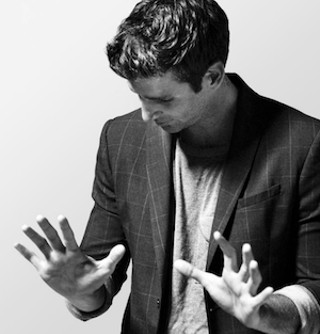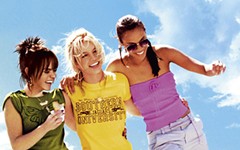Joshua Jay Tells You How They Died Their Tragic Deaths
Magicians, their assistants, audience members: Killed onstage
By Wayne Alan Brenner, 2:24PM, Mon. Feb. 18, 2013

Joshua Jay isn't just spinning yarns, here – he's recounting actual history.
The NYC-based professional magician – award-winning, book-writing, highly respected – comes to Austin's Jewish Community Center tomorrow night with his true-life tales of how conjurors and their assistants (and sometimes hapless audience volunteers) have met their ends in mid-performance throughout history. He'll be enhancing this talk with his own close-up prestidigitation (and possibly a singularly dangerous effect that was part of Harry Houdini's repertoire).
[Houdini's death, coincidentally, we're aware of: The great man was killed by a combination of appendicitis and an unexpected gut-punch from some Canadian ass-hat backstage after a show. The other deaths, well, we're looking forward to what grisly facts the dapper Jay's research reveals on Tuesday night.]
We spoke with Jay via the quotidian magic of cell-phone technology a few days ago, interviewing him after he returned from getting a vaccination against yellow fever – required prep for his upcoming tour to Africa:
Austin Chronicle: How did you get started with magic?
Joshua Jay: My father did a card trick for me when I was seven years old, and didn't tell me how it was done – and his not telling me how it was done was what hooked me for life. I just loved everything about it: The puzzle aspect, the astonishment of it, the presentation, the manual dexterity. I was totally and completely in awe of it, and that was that.
AC: And now, many years later, you're working as a professional magician, and you focus on sleight-of-hand and close-up work as opposed to stage magic. Why do you continue to do that and not go for the more showy illusions?
Jay: Well, a few reasons. The first is getting to interact with people. For me, one of the most interesting aspects of close-up magic is that the show truly is altered every time I do it, because the people I'm working with impact the show – with the cards they pick, the choices they make, the things they say. It's all very consequential stuff in a close-up show, and not so much for stage magic. And I think the sensation of experienced beautiful close-up magic is as close to the real thing as possible. When you see something far away, eh, it could be magic, it could be a lot of things. But there's something that resonates when people see magic done up close, in their face – it's pretty amazing.
AC: Your presentation at the JCAA is called "Tragic Magic" … ?
Jay: I'm a leading expert on a very small niche in magic history, which is about the magicians and spectators and magicians' assistants who have been killed in the line of magic. Actually decapitated, actually sawn in half, shot during the bullet-catching trick – lots of these gruesome, weird things. There's no podium or anything, it's not that kind of a talk – I tell stories that put people in the audience into the moment, take them back and give them the context, tell these brutally weird and sad and tragic – and also hilarious – stories about how magic tricks throughout history have gone fatally awry.
AC: Is a fascination with death a sort of typical trait of magicians, or is that you in particular?
Jay: I think that the magician's fascination with death happens because audiences are fascinated by death. The element of danger is a proven dramatic device – it makes a magic show more relevant and more believable.
AC: What's the most dangerous trick that you perform?
Jay: I will probably do it in Austin, all things being equal. It's called, simply, The Needle. It's a trick I've recreated from Houdini's repertoire. You take twenty brand-new needles, swallow them; and then you swallow a length of thread; and then you regurgitate the thread with the needles on it. It's a beautiful illusion, very rarely seen anymore – because it's quite dangerous, if you don't know what you're doing. But I've got clearance from a physician to do it in a controlled setting, and I ingest a lot of water beforehand, which helps.
AC: And besides your presentations on "Tragic Magic," you also do just regular magic shows, right? That's how you make a living?
Jay: Oh, yeah, I make my living doing my own shows. "Tragic Magic" is a very special sort of thing, and something I've been doing for a while. I keep busy doing a mix of magic-related things, but my own magic, well, recently I performed at the Veterans' Inaugural Ball in DC, last Sunday I did a show at the Rubin Museum in New York, and I'm going to England straight from Austin, to do a magic show in London. I've done collaborations in the last year with HBO – I keep very busy performing.
AC: Who's working in the field of magic these days that you find inspirational?
Jay: I take a lot of my inspiration from outside of magic. If you could see my normal show that I do, I talk a lot about the art and artists that inspire me – people like William Kentridge, Alfred Hitchcock, Picasso, and a few other artists that I talk about explicitly in my work. But, as far as other magicians? They're probably not people that you've heard of. There's a magician named Juan Tamariz in Spain, who I consider to be the greatest living magician. He doesn't really come to the States, and he's not on TV, but he's – he's just marvelous.
AC: OK, and I'm asking this next question because a friend wanted me to ask you: Are you related to Ricky Jay?
Jay: [laughs] No, I'm not – but that's a common question I get. I'm not related to Ricky at all. Jay is my real last name; his real last name is Potash.
AC: And, speaking of Ricky Jay, what did you think of the movie The Prestige?
Jay: I've seen The Prestige, and the other one that gets lumped in with it – The Illusionist – because they came out at the same time. And I like elements of both of those movies, but my response has always been – and this is no criticism of those films – but the real history of magic is so fascinating and so outrageous, some of the stories I tell border on the unbelievable because they're so strange, that I find it odd that people will reach into fiction to dream up things for magicians, when the things that they dream up are nowhere near as spectacular as the real thing.
A note to readers: Bold and uncensored, The Austin Chronicle has been Austin’s independent news source for over 40 years, expressing the community’s political and environmental concerns and supporting its active cultural scene. Now more than ever, we need your support to continue supplying Austin with independent, free press. If real news is important to you, please consider making a donation of $5, $10 or whatever you can afford, to help keep our journalism on stands.
March 22, 2024
March 22, 2024
Joshua Jay, Tragic Magic, sleight-of-hand, Dell Jewish Community Center, Houdini, actually decapitated, Rosabel, believe








